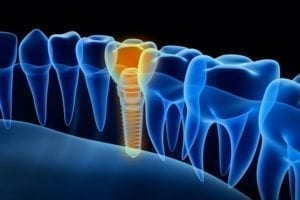Both dentures and dental implants are popular forms of replacing missing teeth. But how do you know which one is the right choice for you? Dr. Brock Hyder of Payette Dental discusses both dentures and dental implants in Payette, ID.
All About Dentures
Dentures are usually used to replace a full arch of missing teeth, but partial dentures are available as well. They’re made of a metal and resin base that supports teeth made of plastic or dental ceramic. Some of the benefits of dentures are that they’re cheaper upfront and you can get your dental restoration quicker, as there’s no surgical aspect like with implants.
However, dentures come with a lot of downsides as well. When you lose teeth, your jawbone starts to deteriorate in that area. Since dentures don’t replace the tooth root, your jawbone will continue to deteriorate even when the dentures are in. This can lead to paying more down the line to readjust or replace your denture. Once the jawbone has deteriorated a certain amount, the dentures won’t fit well enough to be functional.
Dentures also only give you back about 30-40% of your bite function. You’ll have to remove certain foods from your diet. Dentures require adhesive to stay in and they can slip while you’re talking or eating. Because they’re removable, they need to be taken out and cleaned thoroughly each evening. Despite advances in dental technology, dentures can still be bulky and take a while to get used to.
The Benefits of Dental Implants
There’s a reason why dental implants are considered the gold standard of tooth replacement. Dental implants are made of three different pieces. First, a titanium post is placed in your jawbone. Next, a piece called an abutment is attached to the post to connect it to the final restoration. Commonly, the final restoration is a dental crown, but dental implants can also support a fixed bridge or denture.
While implants cost more than dentures, you won’t incur further costs in the future. Dental implants are the only restoration that replaces the tooth root as well. This prevents further jaw deterioration and can sometimes reverse the deterioration that’s already taken place. Regeneration is triggered in the jawbone so that it can fuse with the implant post.
Since implants require a surgical element, it does take longer for you to get your final restoration. When the posts are placed in the jawbone, it takes 3-6 months to heal. But this time is crucial to get the stability implants are known for. You get 100% of your bite function back when you get dental implants. Your diet doesn’t have to be changed and you don’t have to worry about your restoration slipping or falling out.
Dental implants both feel and look the most natural, particularly if the final restoration is a dental crown. They don’t require any extra maintenance either. Since they’re a permanent restoration, you don’t have to take them out to clean them or use adhesive to keep them in. Just brush, floss, and make regular dental visits and they’ll last for decades to come!
Getting Dental Implants in Payette, Idaho
Do you think dental implants are the right choice to replace your missing teeth? Call us or schedule an appointment online.
